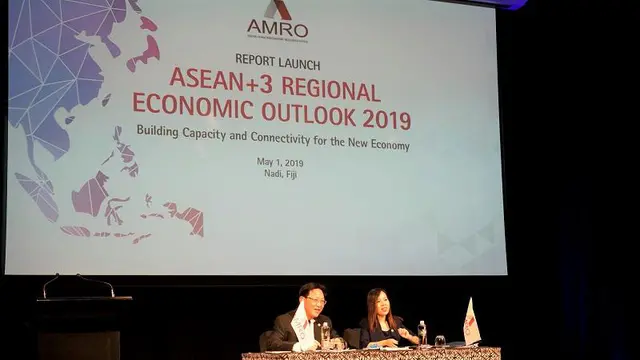By APD writer Melo M. Acuña
MANILA, May 1 (APD) – With more intense global risks and stronger external headwinds, the ASEAN+3 region is expected to remain resilient, “growing at only a slightly slower pace” in 2019-2020 compared to last year.
This was how the new annual flagship report from ASEAN+3 Macroeconomic Research Office (AMRO) looks at the current situation.
In a statement released from Fiji earlier today, AMRO chief economist Dr. Hoe Ee Khor said while regional growth is softening from 5.3% last year to 5.1% in 2019 and around 5.0% in 2020, the longer-term economic fundamentals remain intact.
“Regional policymakers should stand ready to use available policy space to ease monetary and fiscal policies to mitigate the downside risks and support the economy if external conditions were to worsen,” he said.
AMRO identified the sources of downside risks as “mainly external, stemming from an escalation in global trade tensions, a sharper showdown in global growth, and volatility shocks from financial markets.”
With the softer outlook, AMRO said the region’s long-term fundamentals remains intact as it is supported by robust consumption and growing intra-regional trade amid a rising middle class, rapid urbanization and adoption of digital technology.
The same statement disclosed as downside risks have become more pronounced, policymakers have little room for complacency. With the current macro-financial policy stances have been described as “generally appropriate,” regional authorities should be prepared to recalibrate the policy mix to safeguard growth while preserving financial stability.
These may require some easing of monetary policy stance whenever appropriate and sustaining supportive fiscal policy while combining targeted fiscal measures and structural policies to “incentivize” structural adjustments; and maintaining tight macroprudential policy to guard against the build-up of financial vulnerabilities.
To further support the region’s growth prospects ad foster resilience, ASEAN+3 should prioritize longer-term policies, “especially those focused on building capacity and connectivity to leverage on the Fourth Industrial Revolution and sustain growth in the new economy.
(Top image: AMRO Chief Economist Dr. Hoe Ee Khor (left) delivers his presentation on key findings of the AREO 2019 at its launch earlier today in Fiji. /AMRO Photo)
(ASIA PACIFIC DAILY)
 简体中文
简体中文

